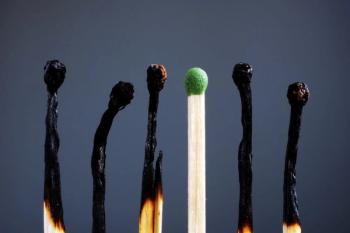
Are You Still Feeling Burned Out?
The latest report on physician burnout is here...
PSYCHIATRIC VIEWS ON THE DAILY NEWS
“I have reached my limit for the BS I can take from the hospital administration, insurance companies, and demanding patients” - Anonymous Physician
The 2024 annual Medscape report on Physician Burnout & Depression was just posted and the news is not so good.1 Once again, I will report on it for Psychiatric Times, allowing for the usual criticism about the nature of the survey.
It is not all bad because there was a slight yearly overall reduction in burnout and depression in physicians, from 53% to 49% and 23% to 20%, respectively. The interpretation in the report is that the negative impact of the COVID-19 pandemic is much diminished, but that the chronic systemic problems in medical workplaces remain.
The most frequent reported response and approach to the problem is that on wellness. However, that has not been enough to offset the increased financial pressures leading physicians to do more and more with less and less.
Topping the specialty list by far is emergency medicine at 63%, that is, about two thirds of those physicians, with next being OB/GYN and oncology at 53%. Psychiatry comes in at 43%, about the same level as last year. It seems like those specialties providing primary care are the most burned out. On the positive side, the burnout rate of cardiologists and critical care physicians has fortunately decreased a bit.
Female physicians continue to have a much higher rate of burnout than male physicians, this year at 54% compared with 44%. Causes of the difference may related to fewer mentors, fewer female leaders, and increased traditional home life demands. We do know that although burnout among physicians is the highest among workplaces, burnout has also increased more generally in the United States, including among parents and marital partnerships. Physician burnout also exists in other countries, but the United States, with our fragmented and inadequate systems, comes out with the highest rates.
Generally speaking, feeling burned out does not seem to be a short-term phenomenon. That derives from little improvement in the majority of systems.
Therefore, there may be no surprise that a third of physicians report feeling that they will leave their current practice in 2 years. Even with more wellness programs, about half of physicians feel that their burnout is being ignored. Personal coping mechanisms only help so much. Loss of autonomy in the workplace is the biggest obstacle.
Although I will not focus today on the depression results, most physicians feel that burnout is a major causative factor for depression. Most do not seek professional help of any kind for burnout or depression. Suicidal thinking was not assessed, although feeling trapped and hopeless could lead to that.
As usual, psychiatry was not teased out in this annual report. However, Psychiatric Times presciently just put together a Clinical Wellness Special Report for the January issue. Included is the innovative recommendation for the importance of taking a lunch break. Back when I retired from clinical work due to being burned out, the last straw was my system prohibiting leaving the worksite for lunch.
Many years back now, I was also on the original workgroup for psychiatrist and physician burnout for the American Psychiatric Association (APA), including being a “poster child” with a brief video discussing my own burnout. That led to being a coeditor for an APA book on the challenge.2 However, in recent years, progress has seemed to stall.
We are currently left with this dilemma. Wellness activities are good, but the more powerful systemic causes of burnout remain little changed. Such lack of progress puts the well-being of both physicians and patients at increased risk. Now that COVID-19 is in remission, it is high time to organizationally return to focus on burnout rather than accepting it as our new normal.
Dr Moffic is an award-winning psychiatrist who specialized in the cultural and ethical aspects of psychiatry and is now in retirement and retirement as a private pro bono community psychiatrist. A prolific writer and speaker, he has done a weekday column titled “Psychiatric Views on the Daily News” and a weekly video, “Psychiatry & Society,” since the COVID-19 pandemic emerged. He was chosen to receive the 2024 Abraham Halpern Humanitarian Award from the American Association for Social Psychiatry. Previously, he received the Administrative Award in 2016 from the American Psychiatric Association, the one-time designation of being a Hero of Public Psychiatry from the Speaker of the Assembly of the APA in 2002, and the Exemplary Psychiatrist Award from the National Alliance for the Mentally Ill in 1991. He is an advocate and activist for mental health issues related to climate instability, physician burnout, and xenophobia. He is now editing the final book in a 4-volume series on religions and psychiatry for Springer: Islamophobia, anti-Semitism, Christianity, and now The Eastern Religions, and Spirituality. He serves on the Editorial Board of Psychiatric Times.
References
1. Medscape physician burnout & depression report 2024: ‘we have much work to do.’ Medscape. January 25, 2024. Accessed January 26, 2024.
2. LoboPrabhu S, Summers R, Moffic HS, eds. Combating Physician Burnout: A Guide for Psychiatrists. American Psychiatric Publishing; 2019.
Newsletter
Receive trusted psychiatric news, expert analysis, and clinical insights — subscribe today to support your practice and your patients.







